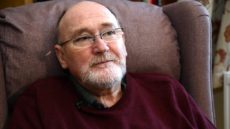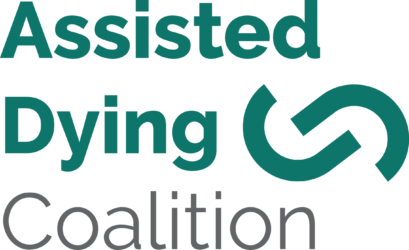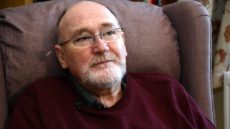
Humanist and assisted dying campaigner Noel Conway.
Assisted dying campaigner Noel Conway, who has Motor Neurone Disease (MND) and has been pushing for a change in the law to allow assisted dying in the UK, has today been refused permission to take his case to the Supreme Court.
Noel, a 67-year-old retired lecturer from Shrewsbury and a member of Humanists UK, suffers from terminal MND. Noel wants the right to die if his condition worsens to the point that he has six months or fewer to live.
However, the Court concluded that there was not a strong enough prospect of the case succeeding to proceed to full hearing.
Humanists UK intervened in Noel’s case at the High Court and Court of Appeal, and would have sought to do so at the Supreme Court too. It campaigns to legalise assisted dying across the UK for people who are terminally ill or incurably suffering and who have made a clear decision, free from coercion, to end their lives.
Following the decision, Humanists UK Chief Executive Andrew Copson said:
‘It is extremely disappointing that the Supreme Court has refused Noel Conway permission to have his case heard. Citizens who are terminally ill or incurably suffering should be able to die with dignity at a time and manner of their choosing and the Court’s decision robs Noel of the chance to challenge this most pernicious of laws.
‘We will continue to campaign for this most fundamental of human rights to be recognised and protected in UK law.’
Nancy Collins, Partner at Hodge Jones & Allen, who represented Humanists UK in this case, said: ‘We are disappointed by the Supreme Court’s decision not to grant Mr Conway permission to be heard before the Supreme Court. We continue to represent Humanists UK who have long campaigned for the right to assisted dying, and whose campaigning will continue.
‘We believe that the right of terminally ill to choose how and when to die, is a fundamental right that should now be recognised and protected by the law.’
The Supreme Court has today published its order refusing Mr Conway permission to appeal along with reasons for the decision. The written reasons do not set out weights the judges gave to different factors in concluding that permission should be refused. In particular, one part of the document (paragraph 3 of the reasons) might be construed as to suggest that refusal was in part due to the nature of Mr Conway’s condition. The judges wrote that Noel could refuse consent to continue his non-invasive ventilation, whilst being simultaneously sedated.
The judges seemed to suggest that they think that such an approach could bring about a quick and painless death. A similar route would not be open to some other classes of claimant, for example Tony Nicklinson or Paul Lamb, who brought a previous case on the matter and are not terminally ill but are incurably suffering. However, whether this factor was decisive, and means that Tony or Paul could succeed where Noel has not, is at present unknown.
NOTES:
For further comment or information, please contact Humanists UK press manager Casey-Ann Seaniger at casey@humanism.org.uk or phone 020 7324 3078 or 07 393344293.
Humanists UK is represented by Nancy Collins from Hodge Jones & Allen LLP and Caoilfhionn Gallagher QC and Graeme Hall of Doughty Street Chambers.
Read the Supreme Court’s decision: https://www.supremecourt.uk/docs/r-on-the-application-of-conway-v-secretary-of-state-for-justice-court-order.pdf
Read our previous news item on Noel Conway’s case: https://humanism.org.uk/2018/11/22/assisted-dying-campaigner-takes-case-to-the-highest-court-in-uk/
Read more about Humanists UK’s campaigns work on assisted dying: http://humanism.org.uk/campaigns/public-ethical-issues/assisted-dying/
At Humanists UK, we advance free thinking and promote humanism to create a tolerant society where rational thinking and kindness prevail. Our work brings non-religious people together to develop their own views, helping people be happier and more fulfilled in the one life we have. Through our ceremonies, education services, and community and campaigning work, we strive to create a fair and equal society for all.

